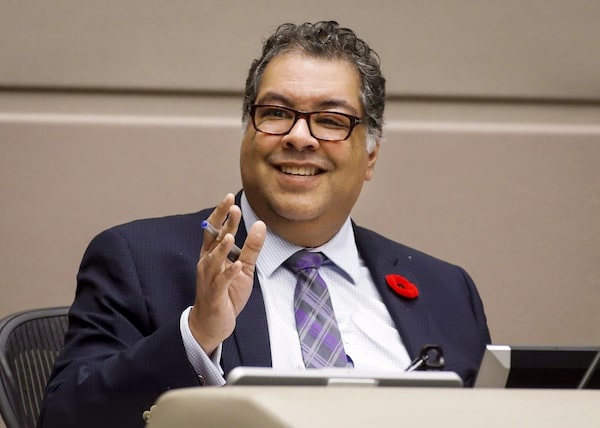
Mayor Naheed Nenshi in Calgary, Alta., on Oct. 31, 2018.Jeff McIntosh/The Canadian Press
Following voters' rejection of holding an Olympic Games in Calgary, the city’s mayor says the billions in funding committed by higher levels of government for infrastructure is still needed.
In a plebiscite on Tuesday, 56 per cent of voters rejected holding the 2026 Winter Olympics and the promise that the Games could boost Calgary’s struggling economy. The vote was non-binding but the city and the bid corporation have both said the process is now over.
The result means the city, which prides itself as a winter sports destination, will no longer receive billions of dollars in promised federal and provincial funding that was contingent on hosting the Olympics.
“I don’t want to dwell on it too much, but Calgarians did say no to $4-billion in funding yesterday,” Mayor Naheed Nenshi said on Wednesday, referring to funding promised by Ottawa, the Alberta government and the International Olympic Committee.
“Maybe we don’t need all those $4-billion if there are no Olympics, but we still need some of it.”
Mr. Nenshi, who supported the bid, said the federal government’s decision to delay announcing its funding for the Games until two weeks before the plebiscite might have contributed to the loss. City council had promised voters would have a month to study the bid, including the funding agreements. Instead, the public was presented with a last-minute document hammered out over a weekend of frantic talks to salvage a funding agreement.
“If the federal government had been to meet their deadline and get their numbers out more in advance, would we have a different response?” Mr. Nenshi asked as he spoke with reporters.
The bid’s demise puts a major roadblock in front of the city’s long-awaited plans for a fieldhouse, a multisport venue that would include indoor fields, running tracks and other facilities. The city has had such a project on its wish list for decades. Supporters of the bid insisted Calgary needed the venue regardless of whether it hosted the Olympics. The city’s $5.1-billion Olympic bid also called for the construction of 1,800 units of affordable housing.
Opponents of the bid argued holding the event would be too expensive and risky, and they rejected the idea that Calgary needed to host a multibillion-dollar sporting event to build infrastructure the city needs.
While some councillors have said they don’t expect the city to move forward with the fieldhouse in an era of austerity, Mr. Nenshi left open that possibility. However, he said the city does not have the money to build the proposed affordable housing.
Alberta Tourism Minister Ricardo Miranda said the province, which had set aside $700-million for the Olympics, would review any future funding requests from Calgary on a case-by-case basis but no plans exist for a special fund to help the city.
Federal Sports Minister Kirsty Duncan did not make herself available for an interview. Her spokesman, Craig MacBride, said in an e-mailed statement that the $1.4-billion in federal money committed to the Games was dependent on a successful bid. Neither Ms. Duncan nor Mr. MacBride were immediately available to respond to Mr. Nenshi’s critique of the federal government.
Moshe Lander, who lectures about sports economics at Concordia University in Montreal, said if projects such as affordable housing or a renovated Olympic oval really are needed, the city should be able to make the same argument even without the bid. Mr. Lander said using the Olympics to wrestle money out of the federal and provincial governments turns the bidding process into a “hostage negotiation” that isn’t the best way to plan, or pay for, major projects.
“If you were able to make a compelling argument to the provincial and federal governments and get them to commit money to it, then I think you should be able to do that this morning without any significant loss of the strength of your argument,” Mr. Lander said.
Most of the investments planned for the 2026 Games were supposed to refurbish existing venues, many of them dating from the 1988 Winter Olympics. A number of bid supporters have warned that those venues will require a significant injection of cash in the next decade to remain up-to-date.
 Justin Giovannetti
Justin Giovannetti James Keller
James Keller